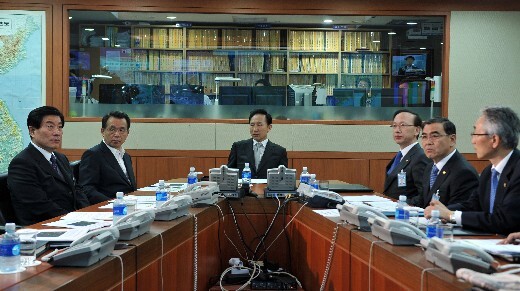hankyoreh
Links to other country sites 다른 나라 사이트 링크
North Korea’s second nuclear test heightens concerns on the Korean Peninsula

North Korea’s second nuclear test on Monday has shaken the political situation on the Korean Peninsula. Observers are referring to it as a large-scale uncertainty that blew up one month and 20 days after North Korea’s April 5 long-range rocket launch.
This latest nuclear test represents a clear violation of United Nations Security Council Resolution 1718, which came immediately after North Korea conducted its first nuclear test on October 9, 2006. Item 2 of this resolution forbids North Korea from conducting any additional nuclear tests or ballistic missile launches. This means there is no room for debating whether the test was intended for peaceful purposes or not, as occurred with North Korea’s long-range rocket launch.
Experts are predicting that some form of sanctions against North Korea will have to be discussed. Since various financial and economic sanctions are possible even in the case of issuing a measure that merely reconfirms Resolution 1718, there is a substantial possibility that another wave of tensions will fall over the Korean Peninsula as experts anticipate strenuous objections from North Korea.
After a certain cooling off period, the U.S. and nations surrounding the peninsula, such as China, will find themselves at a crossroads of a strategic decision between dialogue and containment. There is no real argument among experts that the key to solving the problem is in the hands of the U.S. and China.
Experts are predicting that it will be difficult for the U.S. to continue on with the approach of benign neglect towards North Korea that it has adopted since the rocket launch. “Hasn’t it been demonstrated that the current heightening of tensions cannot be stopped simply through a U.N. Security Council resolution, stronger sanctions or a strategy of disregard?” said Hankyoreh Peace Research Institute director Kim Yeon-cheol. “It will be a nuisance for the U.S., but it will switch over to negotiations,” Kim predicted.
In light of debates that have taken place within the U.S. since North Korea’s rocket launch, there is a considerable likelihood that the U.S. will find itself in a dilemma before pursuing negotiations. “The U.S. could attempt to conduct negotiations by taking North Korea’s nuclear capabilities as a given and focusing on non-proliferation,” said a foreign policy expert who wished to remain anonymous. “In that case, there’s no real logic to deter South Korea and Japan from moving to arm themselves with nuclear weapons.” Furthermore, it is apparent that China will also attempt to disavow North Korea’s nuclear capabilities, which would disrupt the nuclear balance in Northeast Asia.
On the other hand, if they pursue North Korea-U.S. talks on the precondition of North Korea’s abandonment of nuclear weapons, there is a substantial possibility that Pyongyang will demand that the U.S. withdraw its forces from South Korea or stop providing its South Korea-Japan nuclear umbrella. This would be a difficult demand to meet, as it would necessitate a fundamental revision of the U.S.’s Northeast Asia strategy.
Analysts are also raising the factor of China’s influence in its roles as mediator and arbitrator. While China does not have much leverage with North Korea, the fact that Pyongyang-Beijing relations are relatively smooth currently in comparison with the first nuclear test in 2006 gives some measure of expectation. “There is a strong possibility that China will be busy with the Obama administration,” said one former high-ranking official.
“It seems like the situation on the Korean Peninsula may ultimately be at the mercy of the activities of the North Korea-China-U.S. triangle,” the ex-official predicted.
Please direct questions or comments to [englishhani@hani.co.kr]
Editorial・opinion
![[Column] Season 2 of special prosecutor probe may be coming to Korea soon [Column] Season 2 of special prosecutor probe may be coming to Korea soon](https://flexible.img.hani.co.kr/flexible/normal/500/300/imgdb/original/2024/0426/3317141030699447.jpg) [Column] Season 2 of special prosecutor probe may be coming to Korea soon
[Column] Season 2 of special prosecutor probe may be coming to Korea soon![[Column] Park Geun-hye déjà vu in Yoon Suk-yeol [Column] Park Geun-hye déjà vu in Yoon Suk-yeol](https://flexible.img.hani.co.kr/flexible/normal/500/300/imgdb/original/2024/0424/651713945113788.jpg) [Column] Park Geun-hye déjà vu in Yoon Suk-yeol
[Column] Park Geun-hye déjà vu in Yoon Suk-yeol- [Editorial] New weight of N. Korea’s nuclear threats makes dialogue all the more urgent
- [Guest essay] The real reason Korea’s new right wants to dub Rhee a founding father
- [Column] ‘Choson’: Is it time we start referring to N. Korea in its own terms?
- [Editorial] Japan’s rewriting of history with Korea has gone too far
- [Column] The president’s questionable capacity for dialogue
- [Column] Are chaebol firms just pizza pies for families to divvy up as they please?
- [Column] Has Korea, too, crossed the Rubicon on China?
- [Correspondent’s column] In Japan’s alliance with US, echoes of its past alliances with UK
Most viewed articles
- 1Samsung subcontractor worker commits suicide from work stress
- 2‘We must say no’: Seoul defense chief on Korean, USFK involvement in hypothetical Taiwan crisis
- 3Is Japan about to snatch control of Line messenger from Korea’s Naver?
- 4Division commander ordered troops to enter raging flood waters before Marine died, survivor says
- 5[Editorial] Korea’s surprise Q1 growth requires objective assessment, not blind fanfare
- 6No good, very bad game for Korea puts it out of Olympics for first time since 1988
- 7US overtakes China as Korea’s top export market, prompting trade sanction jitters
- 8Korea’s 1.3% growth in Q1 signals ‘textbook’ return to growth, says government
- 9N. Korean delegation’s trip to Iran shows how Pyongyang is leveraging ties with Moscow
- 10[Column] Season 2 of special prosecutor probe may be coming to Korea soon